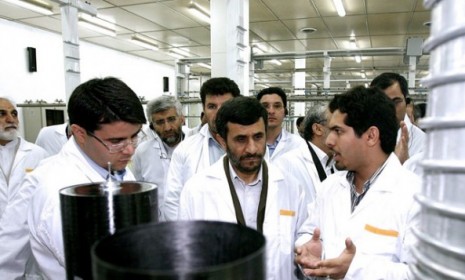Should the West just let Iran enrich uranium?
The Nuclear Non-Proliferation Treaty allows countries to enrich uranium if they agree to rigorous monitoring. Should that standard apply to Iran, too?

A free daily email with the biggest news stories of the day – and the best features from TheWeek.com
You are now subscribed
Your newsletter sign-up was successful
Tensions are rising over Iran's uranium enrichment program, which the U.S. and Europe insist is part of a surreptitious bid to build nuclear weapons. Iran's Islamist leaders, who maintain that they're only interested in nuclear energy, refuse to back down. In response to a potentially devastating new European ban on importing Iranian oil, Tehran is escalating its rhetoric, renewing threats to disrupt all tanker traffic out of the Persian Gulf. Is it time for the West to accept Iran's nuclear program?
Yes. Let Iran enrich all the uranium it wants: "The West is all but isolated in insisting that Iran must not enrich," says Peter Jenkins at Britain's Telegraph. Most other nations think Iran should be treated like every other Nuclear Non-Proliferation Treaty nation, and be "allowed to enrich uranium in return for intrusive monitoring" by International Atomic Energy Agency inspectors. Iran won't seem as threatening with tough safeguards in place to make sure it's not building a bomb. And if we allow Iran to enrich uranium, and Tehran pursues nukes anyway, "the world will be united in condemning such a betrayal of trust."
"The deal the West could strike with Iran"
The Week
Escape your echo chamber. Get the facts behind the news, plus analysis from multiple perspectives.

Sign up for The Week's Free Newsletters
From our morning news briefing to a weekly Good News Newsletter, get the best of The Week delivered directly to your inbox.
From our morning news briefing to a weekly Good News Newsletter, get the best of The Week delivered directly to your inbox.
Are you kidding? Waiting is foolhardy: There may be no smoking-gun proof that Iran is trying to put together a nuclear weapon, say David Albright, Paul Brannan, Andrea Stricker and Andrew Ortendahl at the Institute for Science and International Security. But "it has pursued a strategy of nuclear hedging" and is building centrifuges under "great secrecy." Why should we trust Iran? Every day we let Iran's nuclear program continue unchecked only shortens the time it would take the country to build a bomb once it decides to do it.
"Reality check: Shorter and shorter timeframe if Iran decides to make nuclear weapons"
Iran's uranium isn't the real issue: There's "nothing illegal" about Iran's stockpiling of low-enriched uranium, says nuclear physicist Yousaf Butt at Foreign Policy. Brazil, Argentina, and Japan — none of which have nuclear weapons — all have plenty of uranium-producing capabilities. Let's be honest: Judging from the "impossible conditions" Western sanctions impose, it's pretty clear the the U.S. and Europe aren't after Iran's nuclear program — they're out to "dismantle the current regime" entirely.
A free daily email with the biggest news stories of the day – and the best features from TheWeek.com
-
 Sepsis ‘breakthrough’: the world’s first targeted treatment?
Sepsis ‘breakthrough’: the world’s first targeted treatment?The Explainer New drug could reverse effects of sepsis, rather than trying to treat infection with antibiotics
-
 James Van Der Beek obituary: fresh-faced Dawson’s Creek star
James Van Der Beek obituary: fresh-faced Dawson’s Creek starIn The Spotlight Van Der Beek fronted one of the most successful teen dramas of the 90s – but his Dawson fame proved a double-edged sword
-
 Is Andrew’s arrest the end for the monarchy?
Is Andrew’s arrest the end for the monarchy?Today's Big Question The King has distanced the royal family from his disgraced brother but critics claim a ‘fit of revolutionary disgust’ could still wipe them out